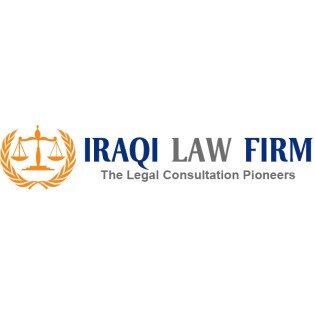Best Climate Change Law Lawyers in Baghdad
Share your needs with us, get contacted by law firms.
Free. Takes 2 min.
List of the best lawyers in Baghdad, Iraq
About Climate Change Law in Baghdad, Iraq
Climate Change Law in Baghdad, Iraq, is part of a growing area of environmental legal practice focusing on mitigation, adaptation, and regulation related to climate change. As a country affected by rising temperatures, water scarcity, and frequent dust storms, Iraq is facing pressing challenges because of global climate shifts. Laws and regulations are designed to address environmental impact, promote sustainable development, fine or penalize polluters, and regulate emissions from industries. These laws are relatively new and evolving, shaped by both national objectives and Iraq’s commitments under international agreements, such as the Paris Agreement which Iraq ratified in 2021.
Why You May Need a Lawyer
Navigating Climate Change Law can be complicated, particularly for businesses, government agencies, and individuals whose activities may contribute to pollution or who are impacted by environmental regulations. Common situations where legal help might be required include:
- Starting a business that emits greenhouse gases or other regulated pollutants
- Dealing with penalties or enforcement actions from regulatory agencies
- Participating in government procurement for renewable energy projects
- Acquiring permits for water, waste, or emissions management
- Complaints regarding environmental damage or public health risks
- Challenges or appeals related to climate-related government projects
- Engagement in local, regional, or international climate initiatives
Lawyers specializing in Climate Change Law help protect legal rights, ensure compliance, prepare necessary documentation, and represent clients in disputes or negotiations with authorities.
Local Laws Overview
The key aspects of local laws relevant to Climate Change Law in Baghdad, Iraq, include:
- The Environment Protection and Improvement Law No. 27 of 2009: This is the primary environmental legislation in Iraq, setting standards for pollution control, waste management, and environmental permits.
- National Climate Change Strategy: Adopted in line with global agreements, this policy outlines actions to reduce greenhouse gas emissions and adapt to climate change impacts.
- Renewable Energy Instructions: Laws supporting the development and use of renewable energy sources to reduce dependence on fossil fuels and lower carbon footprints.
- Penalties and Enforcement: Fines, suspension of operations, and other penalties apply to entities that violate climate-related regulations.
- International Commitments: Iraq's obligations under the Paris Agreement and other accords influence national legal standards and open new opportunities for environmental projects.
Baghdad also enforces local ordinances to address issues such as air quality, water conservation, and waste management, all of which are increasingly aligned with climate goals set by national and international policies.
Frequently Asked Questions
What is Climate Change Law?
Climate Change Law refers to regulations, policies, and statutes aimed at reducing greenhouse gas emissions, adapting to the impacts of climate change, and promoting sustainable environmental practices.
Which government body enforces climate change regulations in Baghdad?
The Ministry of Environment, along with the Baghdad Environment Directorate, is responsible for enforcing climate change and environmental laws in the city.
Do businesses need special permits for emissions?
Yes, businesses that emit pollutants, including greenhouse gases, require environmental permits and must often submit to regular inspections and reporting.
What penalties apply for violating climate change laws?
Penalties can include fines, operational suspension, permit revocation, and legal action, depending on the nature and severity of the offense.
Can individuals sue for environmental damage?
Yes, individuals and communities may bring legal actions if they suffer harm as a result of environmental pollution or government inaction, though such cases can be complex.
Are there incentives for using renewable energy?
Iraq has introduced incentives and supportive policies for both individuals and businesses that invest in renewable energy solutions such as solar panels or wind turbines.
What documents are required to comply with environmental regulations?
Typical requirements include an environmental impact assessment, emissions reports, operating permits, and evidence of compliance with monitoring standards.
How does the Paris Agreement affect laws in Baghdad?
By ratifying the Paris Agreement, Iraq committed to specific emission reduction targets and climate action plans, which are increasingly reflected in national and local legislation.
Are climate change laws the same across Iraq?
While national laws set the framework, implementation and certain regulations may differ by region or municipality, with Baghdad often having stricter enforcement due to its population and pollution concerns.
Where can I find reliable legal advice on climate issues?
Legal professionals specializing in environmental and climate law, as well as government legal aid offices or NGOs, can provide reliable guidance. Be sure to choose advisors familiar with the local legal and regulatory landscape.
Additional Resources
Several resources and organizations can help with legal advice or information regarding Climate Change Law in Baghdad, including:
- Ministry of Environment: The official government body overseeing all regulations, compliance, and policy matters related to climate change and environmental protection in Iraq.
- Baghdad Environment Directorate: Local authority for environmental permitting and law enforcement in the capital region.
- Legal Aid Clinics: Some universities or NGOs offer free or low-cost legal consultations, particularly for environmental concerns.
- United Nations Environment Programme (UNEP) in Iraq: Provides support and may have informative materials or contacts for local legal assistance.
- Non-Governmental Organizations: Organizations such as Nature Iraq and the Iraqi Green Climate Organization can offer advocacy, information, or connections to legal professionals.
Next Steps
If you believe you require legal assistance regarding Climate Change Law in Baghdad, consider the following steps:
- Identify and clearly document your issue or question, including any notifications or documents from authorities.
- Seek a consultation with a lawyer who specializes in environmental or climate change law and is familiar with Baghdad and Iraqi regulations.
- Gather all paperwork, permits, contracts, or correspondence relevant to your issue before your consultation.
- Check with local authorities or NGOs for referrals to reputable legal professionals if you do not have a lawyer already.
- Monitor updates to local and national laws, as climate regulations in Iraq are evolving.
- Act promptly if you are facing a deadline, penalty, or inspection to ensure the best possible outcome.
Climate Change Law in Baghdad is a dynamic field with important consequences for businesses, communities, and the environment. Involving a qualified legal professional can help protect your interests and promote compliance in this vital area.
Lawzana helps you find the best lawyers and law firms in Baghdad through a curated and pre-screened list of qualified legal professionals. Our platform offers rankings and detailed profiles of attorneys and law firms, allowing you to compare based on practice areas, including Climate Change Law, experience, and client feedback.
Each profile includes a description of the firm's areas of practice, client reviews, team members and partners, year of establishment, spoken languages, office locations, contact information, social media presence, and any published articles or resources. Most firms on our platform speak English and are experienced in both local and international legal matters.
Get a quote from top-rated law firms in Baghdad, Iraq — quickly, securely, and without unnecessary hassle.
Disclaimer:
The information provided on this page is for general informational purposes only and does not constitute legal advice. While we strive to ensure the accuracy and relevance of the content, legal information may change over time, and interpretations of the law can vary. You should always consult with a qualified legal professional for advice specific to your situation.
We disclaim all liability for actions taken or not taken based on the content of this page. If you believe any information is incorrect or outdated, please contact us, and we will review and update it where appropriate.















